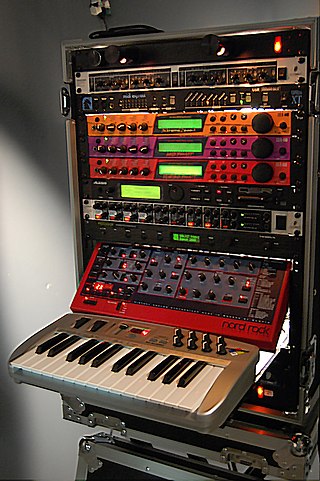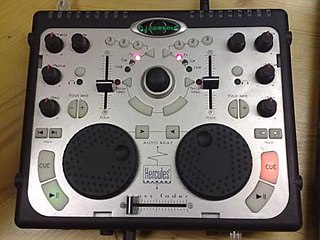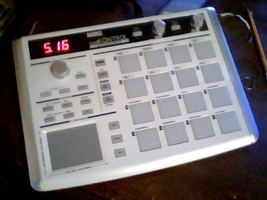Related Research Articles

MIDI is a technical standard that describes a communications protocol, digital interface, and electrical connectors that connect a wide variety of electronic musical instruments, computers, and related audio devices for playing, editing, and recording music.
Roland Octapad is a range of MIDI electronic drum percussion controllers produced by the Roland Corporation.
General MIDI is a standardized specification for electronic musical instruments that respond to MIDI messages. GM was developed by the American MIDI Manufacturers Association (MMA) and the Japan MIDI Standards Committee (JMSC) and first published in 1991. The official specification is available in English from the MMA, bound together with the MIDI 1.0 specification, and in Japanese from the Association of Musical Electronic Industry (AMEI).

Novation Digital Music Systems Ltd. is a British musical equipment manufacturer, founded in 1992 by Ian Jannaway and Mark Thompson as Novation Electronic Music Systems. Today the company specializes in MIDI controllers with and without keyboards, both analog and virtual analog performance synthesizers, grid-based performance controllers, and audio interfaces. At present, Novation products are primarily manufactured in China.
Keytar is a keyboard instrument similar to a synthesizer or MIDI controller that is supported by a strap around the neck and shoulders, similar to the way a guitar is held.

A MIDI controller is any hardware or software that generates and transmits Musical Instrument Digital Interface (MIDI) data to MIDI-enabled devices, typically to trigger sounds and control parameters of an electronic music performance. They most often use a musical keyboard to send data about the pitch of notes to play, although a MIDI controller may trigger lighting and other effects. A wind controller has a sensor that converts breath pressure to volume information and lip pressure to control pitch. Controllers for percussion and stringed instruments exist, as well as specialized and experimental devices. Some MIDI controllers are used in association with specific digital audio workstation software. The original MIDI specification has been extended to include a greater range of control features.

A sound module is an electronic musical instrument without a human-playable interface such as a piano-style musical keyboard. Sound modules have to be operated using an externally connected device, which is often a MIDI controller, of which the most common type is the musical keyboard. Another common way of controlling a sound module is through a sequencer, which is computer hardware or software designed to record and playback control information for sound-generating hardware. Connections between sound modules, controllers, and sequencers are generally made with MIDI, which is a standardized interface designed for this purpose.

Roger Curtis Linn is an American designer of electronic musical instruments and equipment. He is the designer of the LM-1, the first drum machine to use samples, and the MPC sampler, which had a major influence on the development of hip hop. Roger Linn is also a member of the Dead Presidents Society, a group of innovators in the field of electronic music.
The MalletKAT is a musical instrument in a class of MIDI percussion controllers which also includes the DrumKAT, DK10, and TrapKat.

Simmons is an electronic drum brand, which originally was a pioneering British manufacturer of electronic drums. Founded in 1978 by Dave Simmons, it supplied electronic kits from 1980 to 1998. The drums' distinctive, electronic sound can be found on countless albums from the 1980s. The company closed in 1999 and the Simmons name is currently owned by Guitar Center.

The Synesthesia Mandala Drum is a patented electronic drum pad developed by Vince DeFranco and drummer Danny Carey from Tool. It has 128 strike position detection rings from its center to its edge, along with 127 levels of velocity sensitivity. In its current iteration, mk2.9, both values are transmitted via USB MIDI to a computer, where they can be interpreted by any MIDI software. The Mandala also includes its own "Virtual Brain" software. The current USB/software system replaces a hardware brain that the version 1.0 Mandala system had employed. The pad can be struck with drum sticks or fingers and hands.

A guitar synthesizer is any one of a number of musical instrument systems that allow a guitarist to access synthesizer capabilities.

DJ controllers are devices used to help DJs mix music with DJ software using knobs, encoders, jog wheels, faders, backlit buttons, touch strips, and other components.

MainStage is a music application developed by Apple Inc. designed for use in live performance.

The Korg PadKontrol was a USB MIDI controller manufactured by Korg. The PadKontrol was released in 2005 as a competitor to the Akai MPD and the M-Audio Triggerfinger. The PadKontrol has sixteen assignable, velocity sensitive pads, with sixteen "scenes" which allow the user to toggle between various pad configurations, and an assignable X-Y pad for drum rolls, flams, or controller input inside a VSTi or a MIDI sequencer.

Rock Band 3 is a 2010 music video game developed by Harmonix. The game was initially published and distributed by MTV Games and Electronic Arts, respectively, in late October 2010. Mad Catz took over both roles and re-released the title on November 23, 2011. It is the third main game and the 6th major console installment in the Rock Band series. As with the previous titles, Rock Band 3 allows players to simulate the playing of rock music and many other subgenres using special instrument controllers mimicking lead and bass guitar, keyboard, drums, and vocals. Rock Band 3 expands upon previous games by including three-part vocal harmonies — previously used in The Beatles: Rock Band and Green Day: Rock Band — plus support for MIDI-compatible keyboards, electronic drumkits, and even use of a real guitar in "Pro" mode.
Rhythm game accessories are often required to play rhythm games available for various consoles, such as the PlayStation 2, PlayStation 3, Wii, and Xbox 360. These include dance pads, guitar controllers, drum controllers, microphones and turntable controllers. With the exception of microphones, these controllers can generally be used to control any game, but have limited inputs, making them impractical for most games.
The Roland DDR-30 "Alpha Drum" is a digital PCM drum module built by Roland, in early 1985. It was introduced during 1985 Summer NAMM industry trade show in New Orleans.
The Korg DRM-1 Digital Rhythm module built by Korg, in late 1987. It was introduced during 1987 Summer NAMM industry trade show in Chicago.
References
- Wilkes, Steve (July 1998). "Alternate Mode: DrumKAT Turbo". Electronic Musician. pp. 206–209.
- Rothstein, Joseph (1995). MIDI: A Comprehensive Introduction.